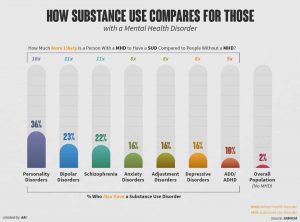
The Heightened Risk of Substance Use Associated With Mental Illness
Substance use disorder can affect people from any background, ethnicity, or gender with equal opportunity, but there are certain factors

Debunking 6 Lies That Bipolar Tells Us
Both depression and mania can be master manipulators—playing tricks on our mind, convincing us to believe things that just aren’t

Everything You Wanted to Know about the Bipolar-Anxiety Connection
Anxiety disorders are the most prevalent coexisting condition with bipolar. In fact, recent studies indicate that more than half of those

Physical Fitness, Bipolar, and Learning Life Is a Marathon, Not a Sprint
Research shows that physical exercise can benefit one’s mental health. But there are other advantages to challenging oneself in this

The Mental Fallout Of Depression (And How to Overcome It)
Even though I am stable, I feel that bipolar depression has permanently changed all aspects of my brain: my memory,

Ask the Doctor: Eat Better, Feel Better!
The sheer convenience of eating processed foods makes them highly attractive, especially when you’re depressed. But what’s the effect inside
